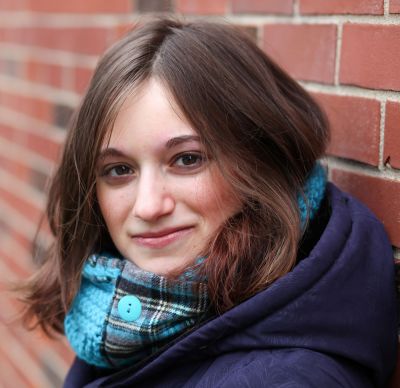About five years ago, Lindsey Fischer interned with the Italian American Collection as part of class requirements for her senior year at Solon High School. Lindsey was looking for an interesting project and was drawn to the collection due to her Italian heritage. She enjoyed the internship so much, she volunteered for another two years during her summers off of school. Since this issue of La Gazzetta is focused on the next generation of Italian Americans, I asked Lindsey, now a graduate student at Ohio University, to write some thoughts on her heritage and her experience as an intern. Here is Lindsey’s story:
My grandfather taught me to believe in magic. His Sicilian blood shone through his tan skin and almond eyes, the same eyes I have. His laugh was loud, as was his voice, and I remember him lifting up his dress pants to reveal gold socks. He was obsessed with Disney and fairy tales. His hands were magic and some of my earliest memories are of sitting on a stool in his workshop, sneezing from the dust, and watching him carve clocks shaped like bears out of wood. One of these bear clocks still hangs in my bedroom. Though he never got to see me become a writer, I take his fairy tales and love of magic and create stories. Whenever I think of my Italian heritage, his face is the first one I see, almond eyes looking into almond eyes.
When I volunteered at the Western Reserve Historical Society, I was excited to be in the city where my grandparents had lived. I once took a walk through Little Italy with my mother and we stopped by a house with a large brick chimney; “Your grandfather built that chimney,” she told me. WRHS held secrets of the lives and traditions of Italians in Cleveland and personal treasures for me as well. Using the microfilm in the library, I found my grandparents’ marriage license. In the archives, I learned about this great Italian community, one that was made of not just family, but neighbors, businesses and friends. A community my grandparents took part in, but one that is unfamiliar to me. While my family is tight knit, there is no longer a city holding us together. My definition of Italian is one of family, not community. Without the benefit of this larger Italian community, I felt that the responsibility of protecting and preserving my own family’s heritage fell on my shoulders.
Preservation is not about objects and papers. These are items that need care, but their value lies in the people behind them. Preservation is about stories. One project I did at WRHS was to inventory the Carabelli Co. Collection. I learned about a family whose tradition was stone carving. As I looked through the business papers, postcards and blueprints, I saw a young child, swinging his legs on a stool in a workshop, just like I used to do. I read the story of a son watching his father chisel letters and flowers and angels into memorial stones, waiting for the day he would hold the tool in his hand. The Carabellis taught me that being Italian American is as much about the general history of Italians in Cleveland as it is about our own individual family traditions. After working in the museum, I was inspired to travel to Italy and learn more about my ancestors, retracing their steps and following their stories.
My Italian heritage, though traditions have been lost, is still a part of my life because of the small acts of preservation I do every day. I preserve my grandfather every time I write a new fairy tale. The Carabellis preserve their ancestors every time they carve a new stone. And I savor my heritage like I savor the Italian ice I buy at The Feast in Little Italy. Each bite makes me crave more; the lemon taste tingles in my mouth, long after the ice is gone.
For me, saying I am Italian American is claiming ownership of my grandfather’s name, Abate. It is participating in three different conversations simultaneously at the dinner table. It is moving my hands while I talk, using two languages at once. I feel the most Italian however, in the moments where I see my personal heritage coming through; when I find my grandfather within myself. In middle school, when I took woodshop, the assignment was to make a wooden lamp by carving two hexagonal bases. We placed a stuffed animal on top of the hexagonal base and ran a ridged metal pole through the animal’s head to hold the lamp shade. I, after much deliberation, chose a bear. It wasn’t until I came home and placed the lamp on my bookshelf, that I saw the clock. The two bears looked at each other and, for a moment, my grandfather made magic real again; his spirit alive and working within my own two hands. My hands, which hold the memories of my Italian heritage, transform memory into story so that my grandfather and all who came before him are never forgotten. My grandfather has been gone for many years, but I still hear his voice every time I write, “Once upon a time.”



